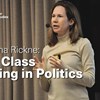labels
Value Superiority
in: The Oxford Handbook of Value Theory Eds. Iwao Hirose and Jonas Olson, Oxford University Press.DOI:10.1093/oxfordhb/9780199959303.013.0013 Suppose that A and B are two kinds of goods such that more
Artificial Intelligence, Datafication and Exploring the Minimum Content of Nationality
The Statelessness & Citizenship Review, 6(1), 124-129 COMMENTARY: Introduction Identifying the minimum content of nationality (‘MCN’), the inalienable core elements or conditions of citizenship witho
Radical right-wing parties in Europe: What populism got to do with it?
Journal of Language and Politics, Volume 16, Issue 4, pp. 485–496. Abstract In this paper I discuss, critically, the literature on populism and the extent to which it applies to the contemporary radical
Consequentialism and Robust Goods
Utilitas, 1–9, doi:10.1017/S0953820819000116 Abstract In this article, I critique the moral theory developed in Philip Pettit’s The Robust Demands of the Good: Ethics with Attachment, Virtue, and Respecvirtue and respect. I argue that Robust-Goods Consequentialism fails because it implies very implausible value judgements.
Research seminar with Johanna Rickne: The Class Ceiling in Politics
Venue: Institutet för framtidsstudier, Holländargatan 13, 4th floor, Stockholm, or online.Research seminar with Johanna Rickne, professor of Economics at SOFI, Stockholm University.Register hereAbstracPrior studies have documented that working-class individuals rarely become parliamentarians. We know less about when in the career pipeline to parliament workers disappear, and why. We study these questions using detailed data on the universe of Swedish politicians’ careers over a 50-year period. We find roughly equal-sized declines in the proportion of workers on various rungs of the political career ladder ranging from local to national office. We reject the potential explanations that workers lack political ambition, public service motivation, honesty, or voter support. And while workers’ average high school grades and cognitive test scores are lower, this cannot explain their large promotion disadvantage, a situation that we label a class ceiling. Organizational ties to blue-collar unions help workers advance, but only to lower-level positions in left-leaning parties. We conclude that efforts to improve workers’ numerical representation should apply throughout the career ladder and focus on intra-party processes.

Johanna Rickne: The Class Ceiling in Politics
Research seminar with Johanna Rickne, professor of Economics at SOFI, Stockholm University Abstract: Prior studies have documented that working-class individuals rarely become parliamentarians. We kno
Bias and Wisdom of Crowds
Philosophical Psychology Abstract Implicit biases have been studied by social psychologists for almost three decades, mainly as an individual phenomenon. Recent proposals, however, reframe implicit bias








